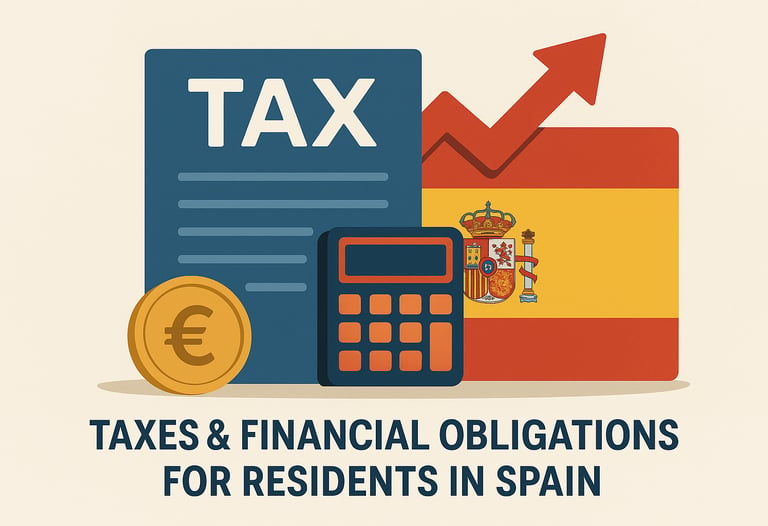Taxes & Financial Obligations for Residents in Spain: A Summarised Guide for Marbella & the Costa del Sol
Thinking of relocating to Marbella or already living on the Costa del Sol? This guide breaks down Spain’s tax residency rules, income tax bands, wealth and solidarity taxes, foreign asset reporting (Modelos 720 & 721), inheritance planning, and everyday financial obligations, everything you need to stay compliant and optimise your position as a Spanish resident.
9/26/20254 min read


Taxes & Financial Obligations for Residents in Spain: A Complete Guide for Marbella & the Costa del Sol
Moving to Spain or already here on the Costa del Sol? Beyond the sunshine and lifestyle, there’s an important reality: once you’re a Spanish resident, the tax system follows you closely, both in Spain and abroad. Whether you have income, property, or investments outside Spain, understanding the essentials is crucial.
This guide breaks down the key obligations for residents in Andalucía (Malaga, Marbella, Costa del Sol) and highlights what you need to know to stay compliant while optimising your position.
1. When Are You a Tax Resident in Spain?
You are considered a tax resident if:
You spend more than 183 days in Spain in a calendar year, or
Your centre of vital interests (family, economic ties, or business base) is in Spain.
Once resident, you are taxed on your worldwide income and assets.
Spain does not recognise “split years”: if you meet the criteria, you’re resident for the whole year.
2. Income Tax (IRPF) in Andalucía
As a resident in Málaga or elsewhere in Andalucía, you’ll pay IRPF (Impuesto sobre la Renta de las Personas Físicas) on worldwide income. This includes salaries, pensions, rental income, dividends, and capital gains.
General Income (employment, pensions, self-employment, rentals)
For 2025, the combined state + regional rates in Andalucía are:
Up to €12,450 → 19%
€12,450 – €20,200 → 24%
€20,200 – €35,200 → 30%
€35,200 – €60,000 → 37%
€60,000 – €300,000 → 45%
Above €300,000 → 47%
Andalucía’s regional adjustments mean slightly lower rates than other regions, especially in the middle brackets, making it one of Spain’s more favourable regions for residents.
Savings Income (dividends, interest, capital gains)
Up to €6,000 → 19%
€6,000 – €50,000 → 21%
€50,000 – €200,000 → 23%
€200,000 – €300,000 → 27%
Over €300,000 → 28%
Allowances
General personal allowance: €5,550 per adult (increases for age and dependants).
Joint declarations available for families, sometimes reducing the bill.
3. Wealth Tax & Solidarity Tax
Wealth Tax (Impuesto sobre el Patrimonio):
National allowance: €700,000 per person.
Main home: exempt up to €300,000.
Andalucía: 100% rebate → residents currently pay nothing, but the return (Modelo 714) may still need to be filed.
Solidarity Tax (Impuesto Temporal de Solidaridad de las Grandes Fortunas):
Applies if net wealth exceeds €3 million.
Rates: 1.7% – 3.5%.
Collected nationally, even in regions with a Wealth Tax rebate (like Andalucía).
4. Reporting Foreign Assets
Spain is especially strict when it comes to assets abroad.
Modelo 720:
Must be filed if you hold more than €50,000 abroad in any category:
Bank accounts.
Investments (shares, funds, insurance, bonds).
Real estate.
Updates required if assets increase by €20,000 or more, or if ownership changes.
Modelo 721 (Crypto Assets):
Applies if crypto held abroad exceeds €50,000.
Must also declare trading profits/losses annually in IRPF.
Other declarations:
Historical Modelo D6 / DD1 for foreign securities still applies in limited cases.
Penalties: The EU forced Spain to soften its notoriously harsh fines for late 720 filings, but non-compliance is still expensive.
5. Inheritance & Gift Tax
Spain taxes the recipient, not the estate.
Andalucía is one of the most generous regions:
Close relatives (children, spouses, parents) enjoy reductions of up to 99%.
For larger estates, planning still matters, especially for distant relatives or non-family beneficiaries.
6. Offshore Companies, Trusts & Complex Structures
“Look-through” rules: If you control or benefit, assets are attributed to you.
CFC regime: Profits in low-tax jurisdictions (below 75% of Spanish tax rates) may be taxed directly in Spain.
Trusts: Spain doesn’t formally recognise them, but beneficiaries are treated as owners for tax purposes.
These structures may assist with estate planning or succession, but they do not shield assets from Spanish taxation.
7. Everyday Practicalities for Residents
Bank transfers from abroad:
Large or regular transfers are reported by banks to Hacienda.
Support from family (e.g. parents covering rent) may count as a gift unless documented properly.
Loans vs gifts:
A loan agreement (ideally notarised) avoids Gift Tax but must be genuine.
Gifts must be declared and taxed unless exempted regionally.
Cash use:
Cash payments above €1,000 between businesses/individuals are prohibited.
Above €10,000 entering/exiting Spain must be declared at customs.
8. Other Key Obligations
Modelo 100: Annual income tax return (due by June).
Modelo 714: Annual wealth/solidarity tax return.
Modelo 210: For non-residents with Spanish property (before residency).
Quarterly VAT / autónomo filings: For self-employed or business owners.
Exit Tax: If leaving Spain after 10+ years of residence and holding shares worth over €4M (or 25%+ stake worth over €1M), unrealised gains may be taxed.
Final Word
Spain offers an unmatched lifestyle — but with it comes a web of tax obligations that many newcomers underestimate. Residents in Málaga and across Andalucía benefit from some of the most attractive allowances in Spain (notably the Wealth Tax rebate and generous inheritance reductions), but they also face some of the most detailed reporting rules in Europe, especially for assets held abroad.
With proper planning, you can:
Optimise your IRPF exposure with local allowances.
Protect wealth with inheritance/gift tax planning.
Stay compliant with foreign asset reporting (720, 721).
Avoid costly mistakes when moving money across borders.
If you’re relocating to Marbella or already living here, MAE Consulting can help structure your affairs efficiently and compliantly — letting you enjoy life in Spain while staying fully covered with Hacienda.
MAE Consulting
Expert guidance for navigating Spanish bureaucracy effortlessly.
© 2025. All rights reserved.


Blog
MAE Consulting is an independent consultancy offering access to vetted professionals. We do not provide legal, tax, or financial advice. All services are delivered through licensed third parties.
CONTACT
SOCIAL CHANNELS
